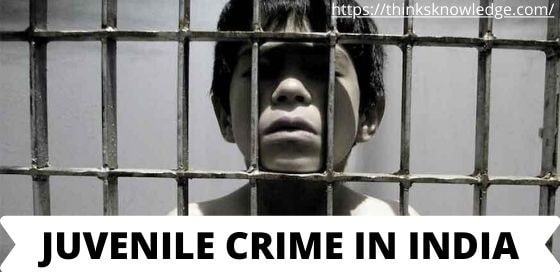In recent years, India has seen it enhance the crime rates committed by minors. On the discussion of sociologists, the major Causes is that the core of these crimes is rural-urban conflict increased crimes in cities. Juvenile Crime in India, most of the criminals belong to rural and semi-urban backgrounds. According to the researchers, these youth are not taking advantage of economic reforms compared to the educated and professional counterparts in the cities. They feel neglected, frustrated, and distressed, leading to crimes like murder, etc.

The increase in the number of rural people migrating to metro cities in search of the job for their better livelihood. However, it does not prepare them for the urban value system. Children become often neglected, as both parents are working and unable to spend time with them. Children do not get the necessary attention and actual value of life—these leading causes for Juvenile Crime in India.
Table of Content
Who is the child criminal?
In our country, Child crime comes in Juvenile Crime in India. That is, the delinquent act of children below a certain age are considered as child crime. But the question arises as to who should be called a child? What is the minimum or maximum age limit for this? In these children of different ages have been considered as child crimes in India. For example, in India, the minimum age for declaring a child as a criminal is 14 years, and the maximum period is 18 years. Therefore, there are no universal assumptions regarding the lowest and maximum ages of juvenile offenders. It is clear from this description that the crime of children up to a certain age is called child crime.
Symptoms of Child offender
After the research and development, some common symptoms found in Juvenile Crime in India that is:
- The body structure of a juvenile is healthy, and a healthy body is strong and fearless.
- They are restless, extroverted, and disruptive by nature.
- His personality is immoral, highly emotional, selfish, and self-centred.
- Myopic and remain ignorant of the consequences of the crime.
- Child criminals often suffer from a psychotic disorder rather than other children.
- Lack of proper balance in id, ego, and superego in Child criminals
- They often appear frustrated, frustrated, and sad.
- These rules are against the power, violating the law, and having unbelieving tendencies.
- They do not have any pre-plan for solving their problem whatever they faced by their society.
- They do not discuss their problem with their family members, or maybe their parents ignored.
Types of Juvenile Crimes In India
According to ‘Howard Baker’ (1966: 226–38) there are four types of child crime –
1. Personal Juvenile Crimes- This indicates the crime in which only one child is involved in committing the crime, and the reason for that is the difference of that juvenile. Psychiatrists have given most criminal interpretations of this criminal behaviour. He argues that juvenile delinquency is caused by psychological problems that mainly arise from the form of faulty improper pathological family interactions. If we can understand the child’s subjective problem, we can stop Juvenile Crime in India.
2. Circumstantial child crime- Circumstantial crime presents a different perspective. The roots of evil are not deep, and the motivations for corruption and the means to control it are often relatively simple. A young person does criminal work without a deep commitment to crime because he or she has less developed mental control and or family control is less intense and because they have relatively little to eat even when caught.
3. Organized Child Crime- This juvenile delinquency refers to the Juvenile Crime in India that is formally committed by developing organized groups. This concept relates to the values and norms that govern the behaviour of the members of a group, encouraging crime, confer reputation based on such actions, and mentioning the specific relationship with the people who group them.
4. Group Supported Child Crimes- These types of Juvenile Crime in India committed in association with others. This kind of crimes are base on personality. The person or in the family of the offender, but the culture of the individual and the neighbourhood.
Causes of Child Crime
Here the causes of adolescent crime have been studied by dividing them into three categories:-
- Social reasons
- Psychological reasons
- Economic reasons.
SOCIAL REASONS FOR CHILD CRIMES
1. Family
Among the causes of adolescence, Elliot and Mery have considered the contaminated family effect to be the most important. Other psychologists found 50 per cent of the differently able children in Chicago and Boston’s 4000 teenage girls. The main circumstances concerning the family are (a) Magnified family, (b) Parental attitude (c) Impact of delinquent siblings (d) Character and conduct of parents.
2. Bad association
The bad association of the child is the reason for the Juvenile Crime in India. Some author discusses criminal behaviour is learned by interacting with another person. In words, A person becomes a culprit due to extreme neglect of the definitions helpful in violation of the law. In boys, one finds evil, and some have good associations. Man’s behaviour affects his companions a lot.
3. School
After school, the personality of the child is affected by his school. Running away from school is a major adolescent crime. The researchers say the main reason for running away from school is the involvement of criminals in the gang of neglect by the teacher. The teacher has weakness in the subject, and the education level is more than the qualification becomes Juvenile Crime in India.
4. Criminal Areas
In the criminal area maximum child has to watch the work and their style in this area. The child does not decide their good and bad. They know that a crime is the one way to become a success over them. So criminal areas also work as Juvenile Crime in India.
5. Social disorganization
Social disintegration involves the dissolution of an individual. As society disintegrates, the number of criminals increases. Therefore, social disorganization is also a cause of adolescence. There is a great lack of coordination and equality in modern industrial society, this increases the tension, and the youth leads the youth towards Juvenile Crime in India.
6. War
During the war and post-war period, rates of adolescent crime were enhancing in this time. There are many barriers to the schooling of the children of the countries involved in the war. Therefore, the child is not taken care of properly. Due to lack of control, girls and girls have a lot of freedom to meet, due to which sexual crimes increase.
7. Entertainment
Entertainment means also have great importance for the development of children. After school, they can get inspiration to do healthy activities in the remaining time only in a good environment. if the child has more free time also motivates criminal behaviour. Sports are a major element in socialization and moral training of children to prevents Juvenile Crime in India.
ECONOMIC REASONS FOR CHILD CRIMES
Scholars differ about the economic cause and the interrelationship of Juvenile Crime in India. George Bold and Healy hold that economic conditions are the cause of child abuse in most cases. In the context of Indian seen that so closely related to economic conditions and child delinquency.
1. Poverty
Poverty is the mother of all evil. Privation is a major cause of Juvenile Crime in India. Poor parents do not provide the basic needs of their children. They start doing anti-social work such as theft, pocket money, trafficking etc. Research believes that Poverty in India is the cause of poverty because of poverty; children become spirit glands. His unconscious mind is motivated to get all the facilities which children of affluent families are enjoying, for this, he adopts illegal methods. The criminal gets caught in gangs, and the criminal starts working. A Government of India research report said that 48 per cent of child criminals were the monthly income was less than Rs 250.
2. Family conflict
studies have shown that the family life of child molesters is not organized and powerful. a study report that child become criminals in a family face divorce, partition, abandonment and death of parents. Child become criminals where family members are fighting. In such families, the emotional balance of children their social development is not possible.
3. Starvation
Due to poverty, people are unable to maintain themselves properly; hence, starvation has to be faced. A hungry person can sin in such a situation, unruly children steal, rob, rob, etc. In this regard, Dr. Hekarwal wrote, “Ape and starvation encourage one to walk the simple and devious path of crime.”
4. Employment of children
Due to poverty, the small children of the family have to do small jobs for their supply. Children from low-income families work in hotels, cinemas, shops and wealthy families, resulting in inferiority complex and mental stress. Children living in such conditions have bad habits of intoxication, smoking, gambling, theft and prostitution. In metro cities, child work as a servant and they work under old servant those servants encourage them to do kinds of Juvenile Crime in India.
PSYCHOLOGICAL REASONS FOR CHILD CRIMES
1. Mental disease
Some criminologists have reported a close relationship between mental illness and crime. Some research focuses on adolescent and found patients with various mental disorders. A child needs treatment, not just punishment. Some mental therapists consider psychopathic personality to be the cause of Juvenile Crime in India. A psychopathic child is born in a family where there is a complete lack of love control and affection.
2. Personality Traits
A very close relationship has also been found in personality traits and a tendency to crime. Personality is a way of adapting to a person’s surroundings. Criminal children use criminal activities in this adaptation. According to ‘Gluek’ In the normal child-like rebellion, doubt, taking pleasure in giving grief to others, emotional and social confusion, violent tendency, incontinence, extroverted nature, etc.
3. Emotional instability
Similarly, emotional instability is the most important psychological cause of crime. Lack of love and empathy, emotional insecurity, harsh discipline, inferiority, and a feeling of inadequacy and reaction to rebellion makes the personality of the boys unbalanced, which motivates the child to be a criminal trader.
Indian Governments make their efforts to improve the condition in Juvenile Crime in India. In the present, juvenile crime has come down, yet there are some shortcomings problems which need to have come. The government takes initiatives in good entertainment of child-like games competition etc. Pornography and faulty movies are banned and make a child advisory centre set up in each district. Provide appropriate training and imparted to the concerned personnel. Prevention of juvenile crime requires coordination between government agencies, educational institutions, police, judiciary, social workers, and voluntary organizations.





